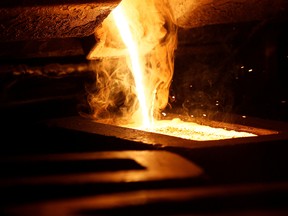Article content
Growing numbers of retail investors are being drawn into commodity trading after two consecutive years of bumper returns, despite concerns they could suffer huge losses or disrupt the complex and volatile markets.
‘People don’t want to see betting on what is essentially their livelihoods’

Growing numbers of retail investors are being drawn into commodity trading after two consecutive years of bumper returns, despite concerns they could suffer huge losses or disrupt the complex and volatile markets.
Story continues below
Retail trading volumes in commodity futures and the largest commodity-focused investment funds surged in 2022. But while activity has been spurred by commodities’ much better recent record than that of stocks and bonds, some market participants and analysts have voiced fears about retail traders wading into a highly volatile market dominated by specialized players.
Daily average trading volumes in CME Group Inc.’s micro contracts for gold, crude oil, silver and copper — which it uses as a proxy for retail activity — were up 93 per cent year on year as of the end of November.
Trading volumes in Invesco Ltd.’s US$6-billion Optimum Yield Diversified Commodity Strategy No K-1 ETF — the largest broad-based commodities fund, which is popular with retail investors — jumped more than 60 per cent and were almost three times as high as in 2020. Volumes across its broader suite of commodities funds climbed 50 per cent.
Story continues below
“We got everyone’s attention last year because people were nervous about inflation,” Kathy Kriskey, commodities exchange-traded fund strategist at Invesco, said. “And then after the invasion of Ukraine, that’s when people started focusing on geopolitical risk (too).”
The burst of trading activity came as the S&P GSCI index of raw materials prices jumped almost nine per cent last year as the war in Ukraine restricted supplies, drawing a stark contrast to the more than US$30 trillion in losses for equities and bonds.
Commodities have been the best-performing major asset class for each of the past two years, according to Bank of America Corp., and were one of just two asset classes to make gains in 2022 alongside cash.
Story continues below
Commodity-focused companies were also the only subsector of the United States stock market to advance, with the S&P 500 energy sub-index advancing 54 per cent as of Dec. 21.
However, while full-year returns have been strong, commodity trading remains risky, with markets liable to extreme swings that can catch retail investors off guard.
In April 2020, for example, the main U.S. oil contract traded below zero for the first time. Many retail traders and platforms had not considered the possibility of negative prices, and the retail brokerage Interactive Brokers LLC lost US$88 million covering margin calls for customers caught out by the price collapse.
Trabue Bland, senior vice-president for futures exchanges at Intercontinental Exchange Inc., cautioned at a recent industry conference that “these are very sophisticated markets where you can lose … whatever you put up with your (broker) in a matter of minutes”.
Story continues below
People rely on us for those prices
Trabue Bland
Besides the risks for retail traders themselves, Bland said he was also concerned about the impact they could have on other market participants, from airlines to farmers.
“People rely on us for those prices,” he said. “Building retail products around something that people are making multibillion decisions on … is not something you should do lightly. People don’t want to see betting on what is essentially their livelihoods.”
Modern indexes such as Invesco’s have updated their strategies to avoid some of the problems that afflicted early commodities funds, which sometimes lost money even when prices rose due to quirks in the pricing of futures contracts.
“We’ve made a huge effort to educate the investor base because … either people have never touched commodities and don’t understand them, or they knew them 10 years ago,” Kriskey said.
Story continues below
She said “you don’t need a lot for (commodities) to be impactful in your portfolio … we talk a lot about a five-per-cent exposure, we don’t want investors coming in and saying ‘I’m 15 per cent commodities.’”
Some companies have encouraged riskier bets. Hong Kong-based fund provider CSOP Asset Management Ltd. late last year announced it would start offering retail traders leveraged exposure to an index of large oil and gas stocks. Leverage allows investors to multiply their potential gains, but can also quickly erase capital when share prices fall.



Story continues below
ProShares, one of the most popular tactical ETF providers with U.S. retail investors, operates eight funds with leveraged exposure to commodity futures. Its leveraged short exposure natural gas ETF is down more than 93 per cent since the start of the year.
Exchange-traded products offering inverse exposure to oil and gas have been hard hit, down almost 90 per cent since the start of the year as prices have risen because of the Ukraine war, according to Morningstar Inc.
“Commodities can spike or crash without investors being prepared, more so than equities,” said Todd Rosenbluth, head of research at VettaFi LLC.
He said retail investors deserved to have the same options available to institutional investors.
“But is it good for everyday investors to have exposure, and to have to manage the roll costs and volatility that come with commodities? That’s a fair question.”
© 2023 The Financial Times Ltd.
_____________________________________________________________
If you liked this story, sign up for more in the FP Investor newsletter.
_____________________________________________________________
Story continues below